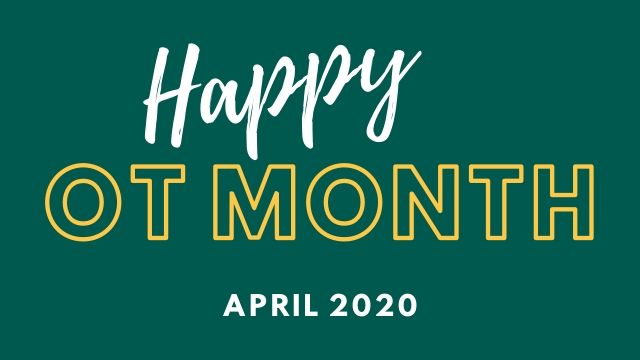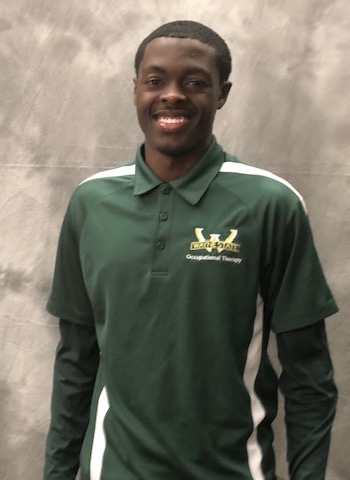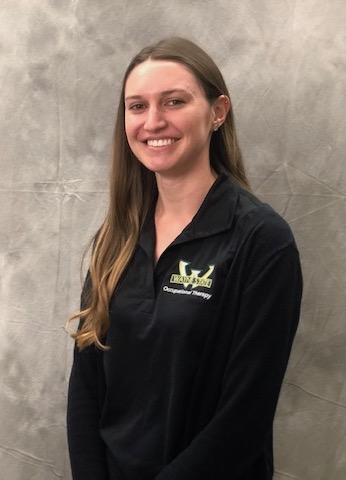April is OT Month! Meet Wayne State students Cliff Lyons and Carmen Carillo
by Assistant Professor Heather Fritz
 April is National Occupational Therapy Month, and while all of our students embrace their roles as leaders and change agents and exhibit a passion for helping others, this week we feature two students who are examples of what it means to be an occupational therapist and a Warrior. Clifford (Cliff) Lyons Jr. and Carmen Carrillo are both second-year OT students in the Wayne State Master of Occupational Therapy (MOT) program. We chose to feature just a few of the ways that they have gone above and beyond what is expected as part of the curriculum to help others live life to the fullest.
April is National Occupational Therapy Month, and while all of our students embrace their roles as leaders and change agents and exhibit a passion for helping others, this week we feature two students who are examples of what it means to be an occupational therapist and a Warrior. Clifford (Cliff) Lyons Jr. and Carmen Carrillo are both second-year OT students in the Wayne State Master of Occupational Therapy (MOT) program. We chose to feature just a few of the ways that they have gone above and beyond what is expected as part of the curriculum to help others live life to the fullest.
 Clifford Lyons Jr.
Clifford Lyons Jr.
After learning that all too often people with catastrophic disabilities, such as spinal cord injuries, do not receive the treatment or equipment necessary to fully achieve their goals, Cliff was inspired to change that situation, especially after learning that recent changes in Michigan’s auto no-fault insurance law would further limit aid available to victims of catastrophic auto-related injuries.
Cliff approached Associate Professor Rosanne DiZazzo-Miller and asked if she would help advise him on how to contact people through her work with traumatic brain injury. His goal? To locate collaborators from appropriate organizations to raise money for those with catastrophic injuries who had unmet needs.
After a few meetings, Cliff came up with a strategy. He chose to partner with SCORE (Spinal Cord Opportunities for Rehabilitation Endowment), a nonprofit organization that provides grants to people paralyzed while participating in sports or recreational activities. Then COVID-19 happened. But it hasn’t stopped Cliff and from continuing to develop philanthropic initiative. With a plan in hand, strong worth ethic and heart of a warrior, he plans to roll out his outreach efforts more formally in the fall, so stay tuned for more details!
“The definition of a true Warrior is when students are touched by lessons in class and leave class feeling that something more should be done to make a bad situation better, and then actually spend the time to make those changes," said DiZazzo-Miller. "I'm so proud of Cliff and so excited for his future clients. Being an occupational therapist is more than assessing and intervening; it's about being an advocate for those who need one.”
 Carmen Carillo
Carmen Carillo
Carmen has repeatedly been recognized by faculty for being an exceptional student. She doesn’t stop there, though. Carmen also serves her fellow students by working as a student assistant to Assistant Professor and Academic Fieldwork Coordinator Kim Banfill, ensuring that students are set up for their Level II fieldwork experiences.
She has gone above and beyond expectations. Carmen has been involved in helping with events such as the MOTEC Fieldwork Educator Days, the Wayne State OT program's 75th anniversary celebration and alumni luncheon, and interprofessional education days at the college.
“Carmen is always willing to lend a helping hand in any matter related to the program and otherwise," Banfill said. "She has not only done an outstanding job of lending a helping hand with these events, and fulfilling her role above the call of duty as a student assistant, but also goes out of her way to volunteer and be involved in academic and extracurricular activities related to the program. I am so very proud of her and I know she will make an outstanding future occupational therapist.”
Working together for breast cancer survivors
Cliff and Carmen were specifically chosen to serve as interventionists in an ongoing trial led by Assistant Professor Heather Fritz that delivers a health behavior change program to rural breast cancer survivors.
Breast cancer survivors are at a higher risk of dying from cardiovascular disease (CVD) than cancer recurrence. Making healthy lifestyle changes to reduce CVD risk factors can lower that risk. Yet, many cancer survivors also have cognitive and functional deficits, and complicated life circumstances as a result of living through cancer and its treatment.
Those challenges didn’t intimidate Carmen or Cliff. Interventionists are trained in how to deliver the program, but they have to rely heavily on their skills in building therapeutic rapport and be able to think creatively. This is a difficult treatment for a seasoned OT to deliver, not to mention a student. Not only do Carmen and Cliff excel in their roles, but they have gone above and beyond what is expected of them to assist clients trying to change and maintain healthy behaviors in the context of COVID-19, when grocery stores are bare and citizens are mandated to socially distance themselves from one another.
“What is so incredible about Carmen and Cliff is that they are providing telehealth treatment to people in the worst possible situation," Fritz said. "They are not only delivering the treatment as directed, they are also looking for ways that clients can obtain their groceries, looking at mobile apps they can use as exercise resources. That’s exactly why our team asked them to be our treating interventionists. We knew from their class performance that they would be up to the task. As we try to assist clients during these unprecedented times, Cliff and Carmen epitomize compassion and client centeredness.”
Model scholars
Though the above examples refer to the ways that Cliff and Carmen go above and beyond outside the classroom, their in-class performance is noteworthy. Not only do they strive for excellence, but they create products that benefit the broader community as well. As part of their motor control course with Assistant Clinical Professor Christine Johnson, students were directed to create resources that OTs could use via teletherapy to help their clients during the COVID-19 crisis. Cliff and Carmen both delivered.
Cliff worked with another student, Max Castoreno, to develop a "Sit and Be Fit" video and handout for use via teletherapy for clients with neurological injury.
Not only is the video a useful resource, but the students made sure to make it fun and engaging for the target population. Johnson shared some of the comments that the OT who received the resources shared:
- “I almost peed my pants watching the sit and be fit video from your student today – wow how creative!”
- “How did he do that?! Was it a filter? I’m putting it on Galaxy Facebook right now! And the PT/OT joke made me laugh out loud.”
- “I want to be his friend and he gets a standing ovation from me! Bring him to Galaxy please.”
- “I won’t forget him. He has to put that video on job applications!"
- “You better tell them that their video is going viral. I shared it with one client and she just sent it to 14 people. It’s also on Galaxy’s Facebook page. She sent it to her pastor at church and all her church friends!"
Although the students were allowed to work in pairs, Carmen chose to work independently and created a cookbook for clients. She understood that grocery stores were bare, and that many people who would not normally cook might be faced with meal planning on a limited budget and with limited access to groceries. She picked recipes that could specifically be made in bulk during the pandemic and included COVID-19 related cooking tips.
Additionally, in consideration of clients with potential residual cognitive deficits from their injuries, she included the measurements of each ingredient in the directions section of the recipe so that they didn’t have to use additional cognitive processing resources to continually scan up to the ingredients as they were processing the directions.
Johnson notes that both excel academically.
“I’ve been really impressed with the depth of their questions and conversations I’ve had with each of them as students," Johnson said. "Additionally, I think their professionalism is truly an example of what each student should strive for.”
